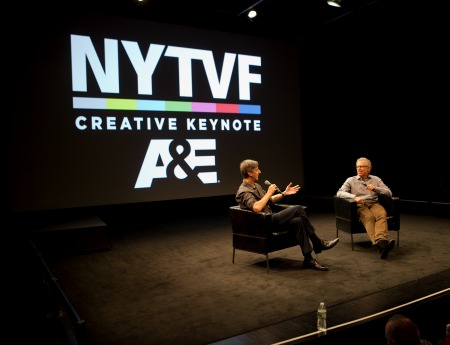Carlton Cuse: Quality A More Valued Commodity Than Commercial Success

The smarter way to stay on top of broadcasting and cable industry. Sign up below
You are now subscribed
Your newsletter sign-up was successful
New York – Carlton Cuse has seen the TV industry change a lot since getting his start in the early 90s with The Adventures of Brisco County Jr., as more and more viewing options has made it that much harder to stand out from the pack.
It’s why Cuse believes that to many networks, the most important commodity in the market right now is quality, even more so than commercial success.
“The reason that we are in sort of a golden age of drama is that quality is a highly-valued commodity right now,” said Cuse during a keynote discussion Tuesday evening during this year’s New York Television Festival. “The important thing now is not to be everybody’s favorite show, but somebody’s favorite show.”
Cuse said shows like Mad Men and Breaking Bad made the value of AMC skyrocket – up until then the network had been a place for old movies – despite those shows pulling in meager ratings (Breaking Bad didn’t pull strong viewership until the very end of its run). “It doesn’t matter if Mad Men or Breaking Bad get huge ratings,” he explained. “It attracts a very desired audience and it creates a lot of buzz.”
Cuse also spoke about the changing nature of TV storytelling, as the multitude of options for viewers has made networks work harder and break more conventions in an effort to stand out from the increasing clutter.
“It’s a lot less formulaic,” said Cuse. “The advent of DVDs and other media platforms has allowed for serialized storytelling.” Cuse said smaller-order series like HBO’s True Detective and FX’s Fargo were two examples of shows that would not have been made in the older days.
While Cuse is currently executive producing A&E’s Bates Motel – for which he is also the showrunner – and FX’s The Strain, he will always be best known for running ABC’s Lost with Damon Lindelof from 2004-2010. Cuse said he got involved with the show after he helped Lindelof with the pilot script (the two worked together on Nash Bridges).
The smarter way to stay on top of broadcasting and cable industry. Sign up below
Cuse would help Lindelof with many of the first few episodes of Lost, but was with another studio under an overall deal – he called his agent to get him out of that deal so he could run Lost full time.
“I decided to make a decision and take a leap based on passion,” he said. “My agent was like ‘are you nuts?’”
Though the show ended up being a critical and commercial success for ABC, Cuse remembers how inside the walls at ABC, many were skeptical of the series’ long-term prospects. “A lot of the things that we thought were cool broke a lot of the conventional rules of television,” said Cuse, pointing to the show’s 16-member ensemble cast and having intentionally ambiguous storytelling – which would become Lost’s calling card.
The pilot – among the most expensive in TV history -- had been greenlit by Lloyd Braun, who was being forced out as chairman of the ABC Entertainment Group. “Even if it does fail, how bad could that be? Everyone is already expecting us to fail,” said Cuse.
Cuse said that he and Lindelof went into Lost thinking they would have only the already-ordered 12 episodes and that would be it; they had no idea the show would be the massive hit it became.
Lost also helped to usher in the era of online fan interaction, where viewers poked and prodded each detail of each episode. “The audience wants to feel like they can influence the show, but at the same time they don’t want to think that you’re making it up as you go along,” he said of some of the pitfalls of intense interaction from fans. Lindelof and Cuse were among the first showrunners that became public figures the way many are today.
“The biggest fear that people had when we’re doing Lost was ‘do you guys know what you’re doing?’”
